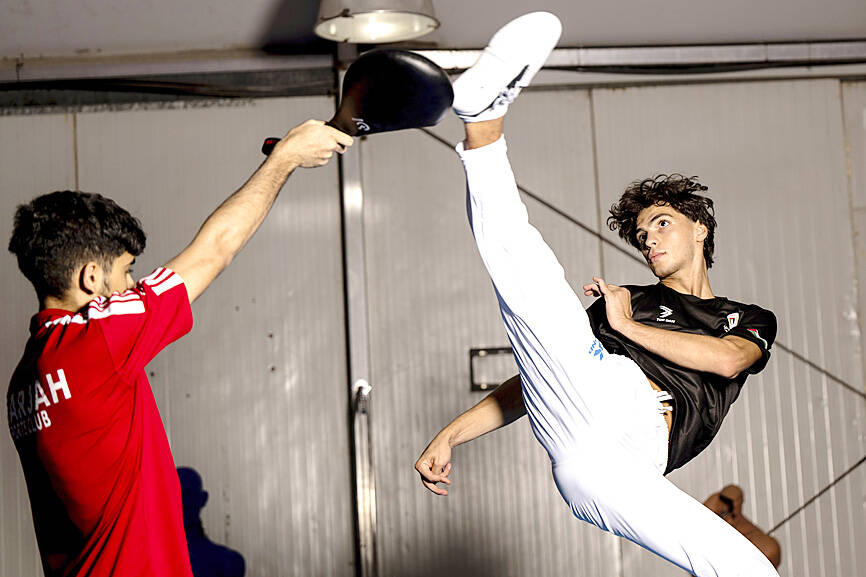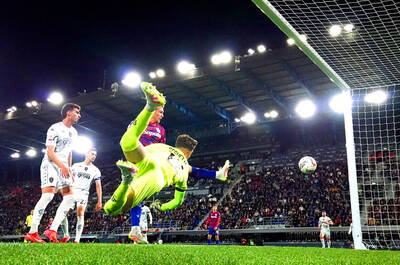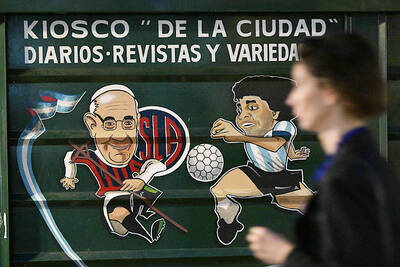Most of the athletes representing the Palestinian territories at the Paris Olympics were born elsewhere — Saudi Arabia, Dubai, Germany, Chile and the US — yet they care deeply about the politics of their parents’ and grandparents’ homeland.
They are eager to compete, but say their presence at the Games is not only, or even primarily, about sports. With Israel and Hamas locked in a brutal war that has killed tens of thousands in Gaza, these eight athletes — two of whom hail from the West Bank — carry heavier burdens.
Yazan al-Bawwab, a 24-year-old swimmer who was born in Saudi Arabia and lives in Dubai, said he does not expect recognition for his performance in the pool.

Photo: AP
He uses swimming as a “tool for Palestine,” he said.
“Unfortunately, nobody has ever asked me about my races. Nobody cares,” said al-Bawwab, whose parents come from Jerusalem and Lod, a city that today is in central Israel. “I’m going to be plain and honest: France does not recognize Palestine as a country, but I’m over there, raising my flag. That’s my role.”
Omar Ismail, who was born in Dubai to parents who come from the West Bank town of Jenin, has loftier athletic ambitions.
Shortly after earning his spot on the team at a taekwondo qualification tournament in China, the 18-year-old said he aims to win a gold medal in Paris.
Even if he does not earn a medal, Ismail — who has visited relatives in Jenin — believes his participation symbolizes something larger than himself.
“I represent the identity of the people in Palestine, their steadfastness,” Ismail said. “I’d like to inspire the children of Palestine, show them that each of them can achieve their goals, give them hope.”
Even under the best of circumstances, it is difficult to maintain a vibrant Olympics training program in Gaza, the West Bank and east Jerusalem. Nine months of war between Israel and Hamas has made that challenge next to impossible.
Much of the country’s sporting infrastructure, clubs and institutions have been demolished, Palestine Olympic Committee (POC) technical director Nader Jayousi said.
“Do you know how many approved pools there are in Palestine? Zero,” al-Bawwab said, adding that the Palestinian economy is too small and fragile to consistently support the development of elite athletes. “There is no sports in Palestine. We are a country right now that does not have enough food or shelter, and we are trying to figure out how to stay alive. We are not a sports country yet.”
The Palestinian diaspora has always played an important role at the Olympics and other international competitions, Jayousi said.
He said it was not the first time that most of the athletes representing the POC come from abroad, adding that the Palestinian diaspora is always represented at any big international sporting competition and Olympics.
More than 38,000 people have been killed in Gaza since the war between Israel and Hamas began, local health officials said.
Among those who died were about 300 athletes, referees, coaches and others working in Gaza’s sports sector, Jayousi said.
Perhaps the most prominent Palestinian athlete to die in the war was long-distance runner Majed Abu Maraheel, who in 1996 in Atlanta became the first Palestinian to compete in the Olympics.
He died of kidney failure earlier this year after he was unable to be treated in Gaza and could not be evacuated to Egypt, Palestinian officials said.
Only one Palestinian athlete, Ismail, qualified for the Paris Games in his own right. The seven others gained their spots under a wild-card system delivered as part of the universality quota places.
Backed by the International Olympic Committee, it allows athletes who represent poorer nations with less-established sports programs to compete, even though they did not meet the sporting criteria.
“We had very high hopes that we would go to Paris 2024 with qualified athletes,” Jayousi said. “We lost lots of these chances because of the complete stoppage of every single activity in the country.”
One Olympic hopeful who did not make the cut was Gaza-born weightlifter Mohammed Hamada, a flag bearer at the 2021 Tokyo Olympics. When the war began, Hamada moved to Gaza’s southernmost city of Rafah and trained there for 25 days, but because of the shortage of food, Hamada — who competed in the 102kg weight class — gradually lost about 18kg.
He eventually secured a visa to leave Gaza and moved to Qatar to continue his training, but he could not get his body back to Olympic-level condition, Jayousi said.
Jayousi said winning medals is not the top priority for the athletes who made it to Paris. (No Palestinian athlete has ever won an Olympic medal.)
“We are going here to show our Palestinianism,” he said. “We are focused on fighting until the last second, which we have been doing as a nation for the last 80 years.”

Bologna on Thursday advanced past Empoli to reach their first Coppa Italia final in more than half a century. Thijs Dallinga’s 87th-minute header earned Bologna a 2-1 win and his side advanced 5-1 on aggregate. Giovanni Fabbian opened the scoring for Bologna with a header seven minutes in. Then Viktor Kovalenko equalized for Empoli in the 30th minute by turning in a rebound to finish off a counterattack. Bologna won the first leg 3-0. In the May 14 final in Rome, Bologna are to face AC Milan, who eliminated city rivals Inter 4-1 on aggregate following a 3-0 win on Wednesday. Bologna last reached the

If the Wild finally break through and win their first playoff series in a decade, Minnesota’s top line likely will be the reason. They were all over the Golden Knights through the first two games of their NHL Western Conference quarter-finals series, which was 1-1 going back to Minnesota for Game 3 today. The Wild tied the series with a 5-2 win on Tuesday. Matt Boldy had three goals and an assist in the first two games, while Kirill Kaprizov produced two goals and three assists. Joel Eriksson Ek, who centers the line, has yet to get on the scoresheet. “I think the biggest

From a commemorative jersey to a stadium in his name, Argentine soccer organizers are planning a slew of tributes to their late “Captain” Pope Francis, eulogized as the ultimate team player. Tributes to the Argentine pontiff, a lifelong lover of the game, who died on Monday at the age of 88, have been peppered with soccer metaphors in his homeland. “Francisco. What a player,” the Argentine Football Federation (AFA) said, describing the first pope from Latin America and the southern hemisphere as a generational talent who “never hogged the ball” and who showed the world “the importance of having an Argentine captain,

Noelvi Marte on Sunday had seven RBIs and hit his first career grand slam with a drive off infielder Jorge Mateo, while Austin Wynn had a career-high six RBIs as the Cincinnati Reds scored their most runs in 26 years in a 24-2 rout of the Baltimore Orioles. Marte finished with five hits, including his eighth-inning homer off Mateo. Wynn hit a three-run homer in the ninth off catcher Gary Sanchez. Cincinnati scored its most runs since a 24-12 win against the Colorado Rockies on May 19, 1999, and finished with 25 hits. Baltimore allowed its most runs since a 30-3 loss to